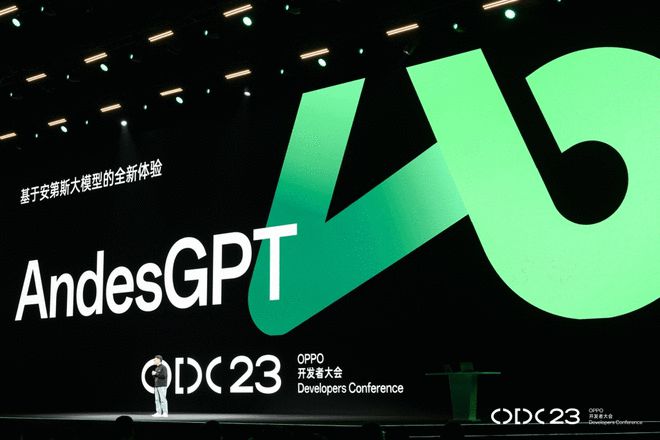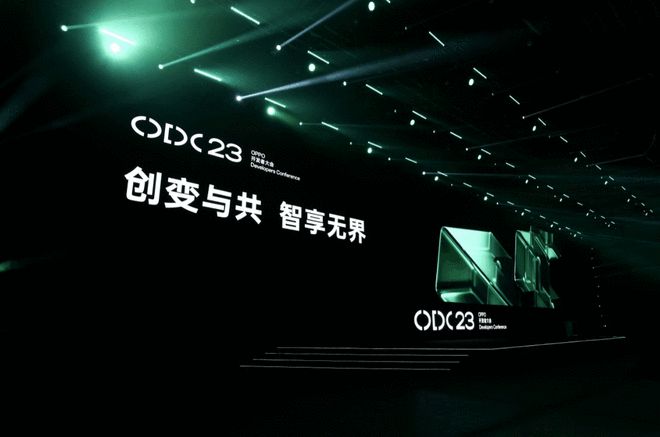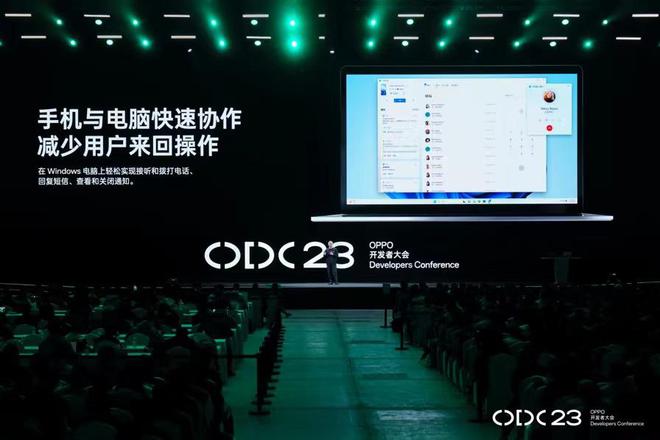OPPO Developer Conference: First Andean Model Pantanal Service Ecological Opening
On November 16th, OPPO held the 2023 Developer Conference today. At the conference, OPPO brought a new generation of ColorOS14, launching the Andes Grand Model (Andes GPT), incorporating the model into mobile phones, and creating a new service ecosystem for the Pantanal intelligent cross end system
On November 16th, OPPO held the 2023 Developer Conference today. At the conference, OPPO brought a new generation of ColorOS14, launching the Andes Grand Model (Andes GPT), incorporating the model into mobile phones, and creating a new service ecosystem for the Pantanal intelligent cross end system.
It is reported that Pantanal and the Andean Grand Model have achieved deep integration for the first time on ColorOS14, not only bringing users a smarter, smoother, and safer experience, but also opening up the possibility of incremental space for developers.
More importantly, OPPO has also created a new service ecosystem with its partners, achieving a new distribution model from finding services for people to finding people for services, ushering in a new era of service distribution.
Three major technological advancements, ushering in a new decade of ColorOS
2023 is the tenth year of the release of ColorOS, and at this developer conference, OPPO released a new generation of ColorOS14. As a ten year answer sheet, Pantanal's intelligent cross end system, Andes Grand Model (Andes GPT), and ColorOS supercomputing platform have achieved deep integration for the first time on ColorOS14.

In this way, the Andean model can enable ColorOS14 to more accurately understand user intentions through its learning and reasoning abilities; Pantanal can structure the system into individual services, actively reminding and recommending users based on their intentions, allowing ColorOS14 to provide exclusive services and improve efficiency for users.
At the beginning of 2023, ColorOS13.1 launched ubiquitous services, which can provide users with various thoughtful and efficient smart services based on location, time, events, and habits in high-frequency scenarios such as commuting, taxis, takeout, and travel.
On ColorOS14, the Pantanal system brings more meta ubiquitous services. For example, in the newly added tourism scenarios, ColorOS14 can provide full service from departure to play, hotel reservations, scenic spot recommendations, to electronic tour guides.
In order to prevent users from missing information or disturbing situations caused by excessive push, OPPO has upgraded its ubiquitous services and launched a new interactive experience called Fluid Cloud, which integrates different third-party application services, system services, and various forms of interaction (capsules, floating layers, flashback windows, etc.).
Fluid clouds are presented naturally and orderly in three forms (bubbles, capsules, and cards) based on the information content and priority of different services.
In terms of interaction methods, through the integration of the Andean model and Pantanal, the new small cloth can achieve natural and smooth dialogue, understand user intentions, and assist users in various complex mobile phone operations.
For example, the brand new Xiaobu can transform into a user assistant, where users do not need to spend energy and time learning each app. They only need to voice their needs and can set up the application machine. For example, users can directly say to Xiao Bu: How can I see the document more clearly? After understanding the user's intentions, Xiaobu will recommend increasing brightness, font size, and screen resolution to help users read the document more clearly.
It is understood that ColorOS14's user assistant has covered nearly 400 settings, providing a simpler way to meet users' basic user needs.
In terms of office experience, ColorOS provides a new efficiency tool that can achieve a more efficient and free office experience. For example, the collection and circulation of information. ColorOS14 has launched a new global fusion creation, which enables users to continuously and batch transfer information such as text, images, and documents across applications and terminals through content extraction, transfer stations, and other functions, greatly reducing operational steps and helping users achieve efficient WYSIWYG information integration.
In terms of mobile office experience, ColorOS14 integrates Microsoft PhoneLink function, allowing mobile phones to seamlessly connect with Windows computers without downloading any applications. Opening mobile applications, making and receiving calls, sending and receiving text messages, and transferring files on a PC can be done. The files received on the phone, collected content materials, and call recordings can be quickly transferred to a connected third-party PC through PhoneLink.
Pantanal is fully commercial and deeply embraces AIGC
Both the smart experience provided to users and the new service ecosystem provided to developers cannot be separated from the open capabilities of OPPO's self-developed Pantanal system.

As a part of ColorOS, the Pantanal system was first commercially available in ColorOS 13.1, bringing two major experiences: intelligent cross end and ubiquitous services; ColorOS13.2, the Pantanal system further connects mobile phones to cars, allowing seamless flow of information and services. It introduces one click recognition of mobile phone address information, allowing for quick navigation connection for taxi/navigation; Remote control of car air conditioning, windows, and other remote vehicle controls using mobile phones.
On ColorOS14, the Pantanal system is fully commercial, expanding ubiquitous services from daily life scenarios to tourism scenarios, and also placing higher demands on interaction, resulting in the fluid cloud mentioned earlier.
For the intelligent cross end aspect that everyone is concerned about, Pantanal has achieved a comprehensive upgrade of data collection, cross end calls, and migration by breaking data barriers through an OPPO account.
The era of AIGC has arrived, and both cloud and end sides are actively embracing generative AI. OPPO is no exception. At this developer conference, OPPO announced the self-developed, personalized and intelligent Andes Grand Model (AndesGPT), which adopts an end-to-end cloud collaborative technology architecture and includes a series of large language models with different parameter scales. Starting from billions, it can reach up to hundreds of billions of levels, supporting diverse application scenarios, providing professional Q&A, machine settings, schedule management, and supporting cultural and graphic graphics Music generation, copywriting, and other creative services.
After the Pantanal system was fully commercialized, it also underwent deep technological integration with the Andean model to form a new intention driven framework. It can deeply understand users' current needs from multi-dimensional variable information such as user context, contextual dialogue, and ongoing events, promote the system to automatically integrate and assemble its own services and third-party services, and provide users with better intelligent services and a one-stop scenario service experience.
It is reported that on ColorOS14, the Pantanal system is optimized through a series of technologies such as low-power perception. In terms of situational awareness ability, compared to the initial release in 2022, scene fence perception has been improved to 12+, perception accuracy has been improved by 3-10%, timeliness has been improved by 30%, and power consumption has been reduced by 20%. The learning cycle of geofencing has also been significantly shortened, from monthly to daily.
OPPO stated that as a terminal manufacturer, OPPO is constantly considering how to use AIGC technology to bring users a more intelligent and convenient experience.
We insist that AI is a tool to help people solve specific problems, not just a gimmick. ColorOS believes that AIGC should first be fully integrated with system applications and deeply integrated with user high-frequency machine scenarios. In the future, ColorOS will continue to explore and launch more large-scale model experiences that are combined with mobile terminals
Create a new service ecosystem, with a total incentive amount of 2 billion yuan unchanged
As is well known, nowadays, massive devices not only provide convenience to users, but also bring many side effects, such as ecological differences between devices, system incompatibility, and significant differences in hardware standards. To solve this problem, higher requirements are put forward for developers. In addition, as the scale of developers continues to expand, but the growth rate of user scale slows down, high-quality developer application services are easily overwhelmed in the massive application market; Even if it is noticed by users, user retention and long-term management have become the focus of developers' attention.

In response to these pain points and challenges faced by developers, OPPO relies on the empowerment of Pantanal's intelligent cross end system. OPPO has also upgraded new services for developers and created a new service ecosystem.
In terms of service upgrade, OPPO has deeply cultivated the open capabilities of application services, content services, and offshore services, enabling the full chain of development, operation distribution, and monetization.
In terms of application services, OPPO provides developers with targeted upgrades throughout the development phase (cloud testing services, update services, privacy automatic detection services), operation phase (open negative one screen cards, smart SMS, and enterprise authentication, etc.), and monetization phase (advertising alliance intermodal transportation), providing a more scientific, efficient, and intelligent collaborative experience.
In terms of content services, the OPPO open platform provides two major content platforms for creators - Lezong Lock Screen and Theme Store. At present, the daily average exposure of Lezong Lock Screen exceeds 11.1 billion; The daily average exposure of themed stores exceeded 540 million, an increase of 6%.
In terms of overseas services, OPPO also provides developers with a "full scenario, localized, and multi resource" solution, helping domestic developers bring services and experiences abroad. It is reported that OPPO's overseas mobile phone scale has achieved rapid growth, ranking among the top four in global shipment volume. The monthly active overseas users have exceeded 340 million, a year-on-year increase of 36%. The monthly distribution volume of overseas software stores has exceeded 390 million, a year-on-year increase of 43%; The monthly distribution volume of browsers exceeded 6 billion, a year-on-year increase of 24%.
In addition, OPPO also focuses on serving the ecosystem and further opening up Pantanal's capabilities. Developers only need to develop once to adapt to multiple entrances, covering not only desktop cards, lock screens, status bars, and other scenarios, but also multiple terminal products such as headphones, watches, and car phones, bringing more possibilities for developers to increase their productivity and user experience.
It is reported that at present, the OPPO service ecosystem has launched 300+services, and the daily exposure of more than 40 services has exceeded 10 million, contributing more than one million daily life growth to developers in local life, travel, finance and other fields, including Elema, Meituan, Alipay, Baidu Maps, etc.
In order to encourage developers to fully embrace the service ecosystem, OPPO also announced the investment of 2 billion resources in 2024 to fully support the high-quality development of service ecosystem developers.
OPPO expressed its hope to work together with developers and creators to build an open ecosystem in the future, bringing wisdom, high-quality services, and ultimate experiences to users. (Cui Yuxian/Wen)
Tag: OPPO Developer Conference First Andean Model Pantanal Service Ecological
Disclaimer: The content of this article is sourced from the internet. The copyright of the text, images, and other materials belongs to the original author. The platform reprints the materials for the purpose of conveying more information. The content of the article is for reference and learning only, and should not be used for commercial purposes. If it infringes on your legitimate rights and interests, please contact us promptly and we will handle it as soon as possible! We respect copyright and are committed to protecting it. Thank you for sharing.


